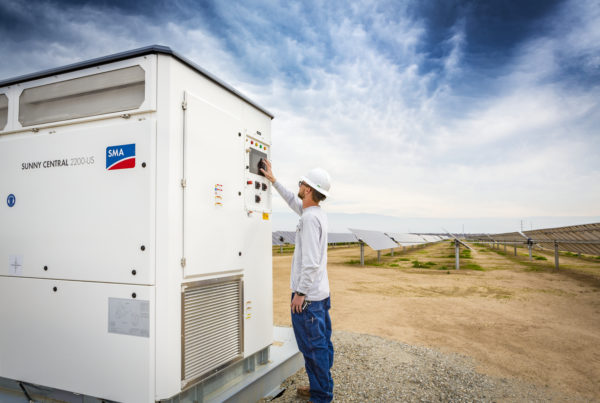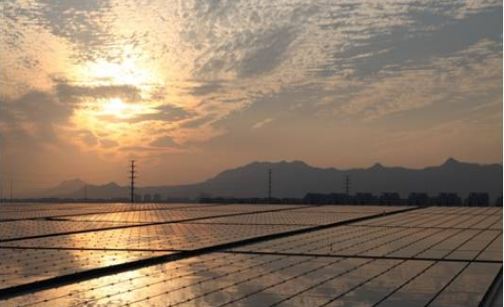It’s a new year, but an old problem; whether the EU should extend its anti-subsidy and anti-dumping trade duties against Chinese solar cell and module manufacturers. It is a topic that has forced the European solar industry to draw battle lines amongst itself, with some heavily opposing them and others just as strongly supporting them.
After the European Commission proposed to extend the duties by two years, this week saw a meeting of trade experts from EU Member States to vote on the proposal. Unsurprisingly, the non-binding vote was ambiguous, as the trade experts voted in favor of the anti-subsidy duties, but in opposition of the anti-dumping duties, forcing an appeal of the latter. So, the case plods on and, as ever, anything remains possible.
Manz gets Chinese boost
German solar manufacturing equipment producer Manz AG will probably be enjoying a celebratory drink this weekend (alcoholic or not!) after securing the biggest order in the company’s history from two Chinese companies. The whopping €263 million order for Manz’s CIGS thin film production equipment came from Shanghai Electric and Shenhua Group, who are evidently keen to puts their chips on a CIGS solar future.
The collaboration does not stop there, as Manz will also be turning over its R&D company to a joint venture with the two companies. Better make that drink a double.
Net metering has been a success in Brazil
Net metering has too often become a point of contention in various parts of the world (anti-solar lobbying from utilities can be thanked for that), but not in the colorful land of Brazil, where more than 7,000 solar installations have been completed under net metering. Those systems together account for a significant capacity of 57.6 MW.

Ok, this is not a game-changing figure, but shows an incredibly sharp increase from the 1,700 systems with a total capacity of 13 MW that had been installed under net metering by the end of 2015. Of course, the increase had some assistance, in the form of regulation changes. It’s almost as if other countries should try it.
Apple want some more of the solar pie
It’s fair to say that Apple probably have a pretty big electricity bill. Luckily, considering its vast consumption, it’s at least trying to source its power from clean energy sources such as solar, with a pledge to power its operations with 100% renewable energy. This week it proved its environmental credentials with an agreement with NV Energy to buy electricity from a 200 MW solar plant that the utility will develop in Nevada.
NV Energy, once the enemy of net metering for solar in Nevada, says that the solar plant will be up and running in early 2019, ready to supply Apple’s data center in Reno with clean electricity.
Get ready for the yearly financials…
It’s that time of year again, when companies start publishing their yearly financial results, plus their fourth quarter results, of course. This week saw some of the early birds post their figures, including SMA Solar Technology (preliminary), Hareon (preliminary) and Scatec Solar, all with varying fortunes.
SMA impressed with record sales output, but did have to settle for a drop in revenue, which accurately sums up the price pressure within the industry. It was slightly less encouraging for Chinese cell and module manufacturer Hareon, who expects a net loss of 380 million – 480 million yuan for 2016, while Scatec can give itself a pat on the back after strong revenue and EBIT increases.

In other news
Mercom Capital released a comprehensive review of the funding for battery storage projects in 2016, Huawei launched its 1500V Smart PV Solution and the International Finance Corporation (IFC) updated the World Future Energy Summit about PV developments in Africa through the IFC’s Scaling Solar program.
This content is protected by copyright and may not be reused. If you want to cooperate with us and would like to reuse some of our content, please contact: editors@pv-magazine.com.



By submitting this form you agree to pv magazine using your data for the purposes of publishing your comment.
Your personal data will only be disclosed or otherwise transmitted to third parties for the purposes of spam filtering or if this is necessary for technical maintenance of the website. Any other transfer to third parties will not take place unless this is justified on the basis of applicable data protection regulations or if pv magazine is legally obliged to do so.
You may revoke this consent at any time with effect for the future, in which case your personal data will be deleted immediately. Otherwise, your data will be deleted if pv magazine has processed your request or the purpose of data storage is fulfilled.
Further information on data privacy can be found in our Data Protection Policy.